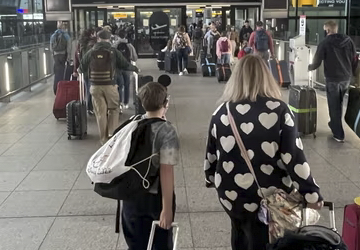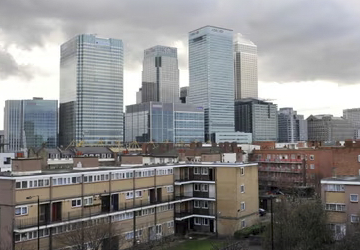UK airlines face higher air traffic control charges despite recent chaos
The UK’s air traffic controller has been given the green light to increase charges by more than a quarter and add to the cost of flying, weeks after a system failure resulted in more than 2,000 flights being cancelled.
The Civil Aviation Authority (CAA) said its pricing decision would give National Air Traffic Services (Nats) the ability to raise fees by about 25% between 2023 and 2027 – in effect increasing the average charge per passenger per flight by 43p, to £2.08.

Airlines reacted with anger to the announcement, calling it a “kick in the teeth” for passengers who would end up picking up the tab in the form of higher fares.
The CAA said its decision would allow Nats to continue to recover its operating costs and finance new investment needed “to provide a high-quality level of service in the future”, as well as recovering revenues lost due to travel restrictions that were in force during the Covid-19 pandemic.
The Prospect trade union, which represents transport industry staff, said investment was essential to maintaining the safety record of the UK’s airspace, which was one of the most congested and complex in the world.
“The CAA have been right to resist pressure from airlines to lower costs even further. This would have led to less investment, fewer air traffic controllers and a less resilient system with more delays for passengers,” said Prospect’s general secretary, Mike Clancy.
There has been growing tension between the CAA and airlines, which have been seeking compensation from Nats after a meltdown in August affected thousands of travellers over the bank holiday weekend.
The chief executive of the industry body Airlines UK, Tim Alderslade, condemned the increase in fees, saying they were “yet another kick in the teeth for passengers who have been plagued by issues this summer including the August Nats IT failure”.
He said passengers would “inevitably end up footing the bill of millions of pounds for increases. That simply cannot be justified while it remains unclear what action will be taken to ensure airlines and their customers do not see a repeat of this disruption.”
He added: “It is clear that a wider independent review into how Nats is regulated is needed to protect passengers and ensure that airlines are not always forced to act as the insurer of last resort and bear millions of pounds of costs for failures that are not their fault.”
Nats, a public-private company in which the state has a 49% share, is licensed by the CAA to run national airspace from its headquarters in Swanwick, Hampshire, and is funded through hundreds of millions of pounds in overflight fees paid by airlines.
skip past newsletter promotion
Get set for the working day – we'll point you to all the business news and analysis you need every morning
Privacy Notice: Newsletters may contain info about charities, online ads, and content funded by outside parties. For more information see our Privacy Policy. We use Google reCaptcha to protect our website and the Google Privacy Policy and Terms of Service apply.
after newsletter promotion
The CAA said its investigation into the system failure was ongoing. “We will consider any further regulatory steps as appropriate following the outcome of the independent review,” it said.
Nats has so far blamed the incident on “an extremely rare set of circumstances” and said in an initial report that it had been triggered by a single piece of data in a flight plan that was wrongly inputted to its system by an unnamed airline.
Willie Walsh, the director general of the global airlines body Iata, has said it was “staggering” that inputting a single flight plan incorrectly could knock the whole system over.
Nats did not confirm whether it would use the extra funding to upgrade its IT systems, saying only that it was studying the CAA’s final decision on pricing.



